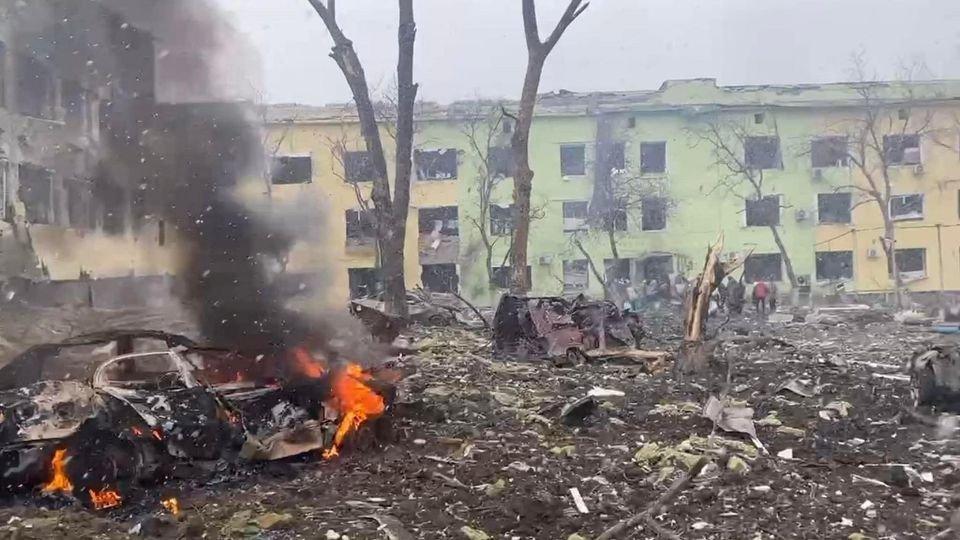
Almost four months after Moscow launched its so-called special military operation in Ukraine, Russia still cannot protect the Donbas cities of Donetsk, Horlivka, and Makiivka from Ukrainian shelling. Unable to defeat the Ukrainian Armed Forces in the region, the Kremlin, through its propagandists, gripes about Western media ignoring Kyiv’s actions in the Donbas.
By Nikola Mikovic
On February 24, when Russian President Vladimir Putin started his military adventure in Ukraine, it became clear that Russia would lose the information war in the West. The Kremlin managed to relatively successfully suppress the anti-war narrative at home, although certain Russian officials still criticize the ongoing invasion of Ukraine.
The West, for its part, has closed its media space for the Russian propaganda narrative during the first days of the Ukraine war. In Western countries and Ukraine, it is widely believed that it is Russia, rather than the Ukrainian Army, that is shelling Donetsk.
On the other hand, Russia blames NATO countries for supplying Ukraine with weapons, claiming that such actions lead to “indiscriminate artillery strikes of Donetsk and other Donbas cities.”
“It has been confirmed that equipment used by the Ukrainian forces during these attacks included NATO-standard 155mm artillery”, said the Russian Embassy in the United Kingdom, calling on the British authorities to “exercise caution and respect its export control standards when supplying arms to Ukraine.”
The Russian Embassy dared not even oppose Great Britain and other Western countries from arming Ukraine. Still, its weak reaction demonstrates Moscow’s political impotence vis-à-vis the Western powers.
Militarily, Russia has already shown that it cannot capture the town of Avdiivka, as well as the village of Marinka, which would positively impact Donetsk since Ukrainian forces would have to end near-constant shelling of the city. Thus, residents of the capital of the self-proclaimed Donetsk People’s Republic will continue living under artillery fire for the foreseeable future.
Meanwhile, the Kremlin will undoubtedly continue issuing empty threats to Ukraine. The problem for Russia is that Kyiv and the West stopped taking such rhetoric seriously long ago.
“The longer the range of the systems that are delivered, the further we will move the Nazis back from the line from which threats to the Russian Federation may come,” said Russian Foreign Minister Sergey Lavrov on June 6.
In reality, Russia withdrew its troops from the Kyiv, Chernihiv, and Sumy regions in early April, which allowed Ukraine to start shelling Russian territory daily. Reports suggest that Ukrainian forces even started conducting strikes in Crimea – internationally recognized as part of Ukraine, although it was annexed by the Russian Federation in 2014. In other words, Russia cannot protect its territory from Ukrainian attacks, let alone the Donbas cities.
But Russian military incompetence does not prevent the Kremlin from bluffing. Russian President Vladimir Putin recently warned the West that Moscow would “strike new targets in Ukraine” if the United States started supplying Kyiv with longer-range missiles. Moreover, the Deputy Head of Russia’s Security Council stressed that Ukraine could “freeze next winter” and “may not exist in two years.”
“I saw a message that Ukraine wants to receive liquified natural gas (LNG) from its overseas owners under Lend-Lease with payment for delivery in two years. Otherwise, it will simply freeze over next winter. Just a question: who said that in two years Ukraine would even exist on the world map” Medvedev asked.
It is worth remembering that in 2015 Russia and its proxies started speculating that “Ukraine may freeze” without the coal from the Donbas and Russian gas. Seven years later, Ukraine is still alive, and Medvedev revived such a narrative.
Although life in Ukraine will undoubtedly be tough next winter, the West will likely ensure the Eastern European country does not “freeze to death.” Moreover, after Russia completes its Donbas, the United States and Great Britain could seriously pressure decision-makers in Moscow and Kyiv to sign a ceasefire agreement that would turn the hot war into a frozen conflict.





